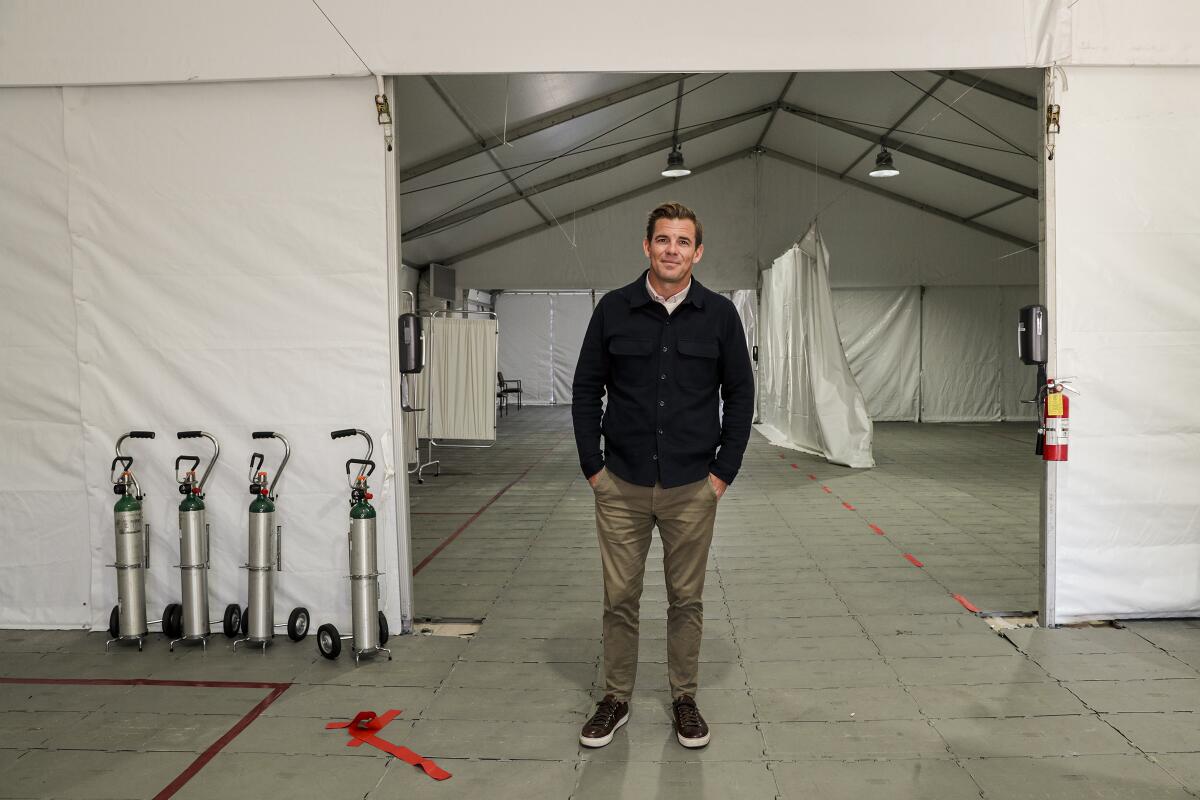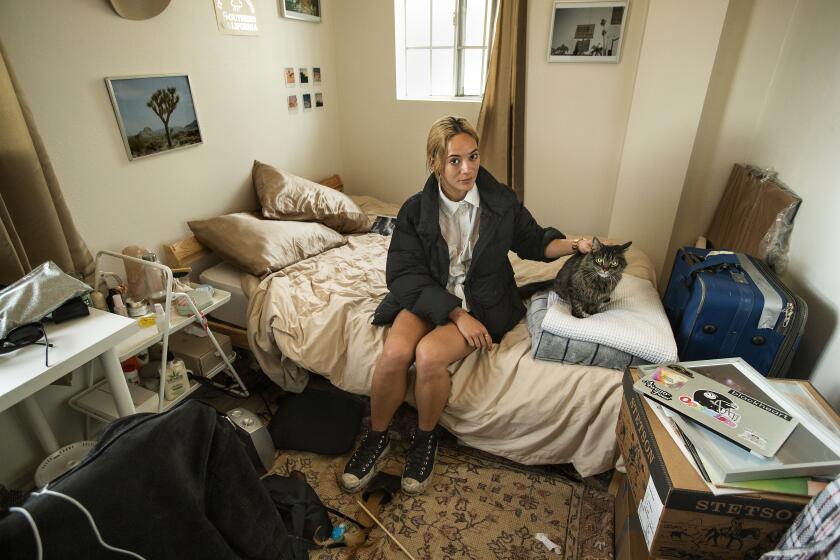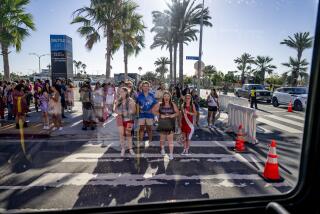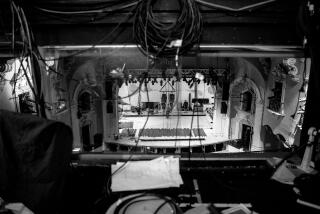They were supposed to build stages for Coachella. Now they’re building coronavirus triage tents

- Share via
Right now, Ryan Choura should be celebrating another busy South by Southwest and BNP Paribas Open tennis tournament and preparing for the Coachella Valley Music and Arts Festival in two weeks.
Choura, the 41-year-old founder of the Torrance-based production firm Choura Events, builds tents, staging and facilities for tens of thousands of revelers at music, sports and dining events in Southern California and nationwide. But in the span of a month, what had been a growing market for live events completely collapsed in the wake of the COVID-19 pandemic.
Live Nation and AEG closed down their entire festival and concert schedule, along with all major sports leagues playing now. His 200 employees were suddenly without any work, and it was difficult to see when anybody would be gathering in public in the near future.
But while it was no silver lining, Choura saw a sudden urgency for very specific services his firm could provide. Hospitals and local governments were in dire need of temporary facilities to treat COVID-19 patients.
“I felt devastated by the changes in the business, how to make payroll and take care of our employees. I’ve never cried more than in the last 14 days,” Choura said, as he stood outside the Fountain Valley Regional Medical Center, where his firm is working overtime to erect heavy-duty triage tents and overflow facilities where doctors will treat an expected flood of coronavirus patients in the coming weeks.
The latest updates from our reporters in California and around the world
The facility — not too dissimilar from the mega-tents housing tens of thousands of ravers at Coachella — is one of four medical villages the company has helped to build so far in L.A.
Unfortunately, demand for such expertise will likely be spiking soon. But given that so many now-idle event firms have the capacity to build mini-cities at music festivals and beyond, this may be a chance to pitch in on some very urgent work and stay viable as businesses.
Some L.A. staging and event-production firms have, in a matter of days, remade their companies to build a first line of defense against the virus.
“We pivoted so fast to being a rapid-response disaster relief team. If I didn’t know how to do Coachella, I couldn’t do this hospital,” Choura said. “I saw patients coming in here and saw what they looked like. This is real, and we’ve got to move.”
The concert and events industry was one of the first to be affected by the spread of COVID-19. Weeks before restaurants, bars and movie theaters were shuttered, and before statewide and local authorities issued “Safer at Home” orders, the cancellation and postponement of festivals like South By Southwest and Coachella were bellwethers for the coming pandemic.
The consequences were immediate and severe for the music and entertainment industries. Billboard estimated that the concert industry employs roughly 250,000 full-time and part-time workers and could lose between $10 billion and $20 billion this year due to the novel coronavirus. While major promoters like AEG and Live Nation will be able to recoup some of their losses from insurance policies, many vendors who were counting on those festivals were, over a matter of days, staring down the complete destruction of their business.
The coronavirus outbreak has already devastated the live music economy. For a small independent venue like Lodge Room in Highland Park, it may be a death knell.
“The entertainment industry was maybe the first to be impacted by this. Even before all the news articles, we started hearing things would be canceled. Over a week it became an absolute standstill and all of our crew had absolutely no work,” said Joey Gallagher, the chief executive of Gallagher Staging, the L.A. firm that was slotted to build out the main stage at Coachella this year. In the wake of the fest’s postponement, it has built tented patient facilities, foam beds and other structures for hospitals in the Bay Area and is working on five similar sites around L.A.
Images of event spaces commandeered for treatment, like the Javits Center in New York City, show harrowing scenes of the medical crises already here and the ones to come. But companies used to the whiplash pace, uncompromising demands and necessary improvisation of the live music industry may be uniquely ready to pitch in during this crisis.
“We’re an industry that moves faster than anyone. We’ll install an entire city on a blank slate,” Gallagher said. “We have everything available: Wi-Fi, radios, generators, lighting, restrooms and wash stations. We can build a small city in a day or two, and that’s a need right now.”
Much of the systemic crisis around treating COVID-19 involves a shortage of specialized medical equipment like ventilators, which California may need in quantities of up to 20,000 at once. But many of the basic structural elements needed for treatment centers — space for hundreds of patients at once with elevated flooring, HVAC and air circulation, even personal protective equipment like face shields — have crossover with the event and concert production world and can be built by these firms on short notice.
“We started looking at what the immediate need was and we’ve been making face shields for two weeks. Our shop makes metal for sets and we can build just about anything,” said Robin Shaw, co-founder of the L.A. and Chicago-based firm Upstaging.
Absent the coronavirus, her firm right now would have been building and transporting sets for Post Malone, Billie Eilish, Pearl Jam, Roger Waters and other spring and summer arena tours. But instead, it has been supplying and transporting face shields, signage and room dividers to nursing homes, prisons and hospitals affected by the coronavirus.
The unpredictability of the concert business proved worthy preparation for responding to a test like this, Shaw said.
“We deal with an industry where if we’re not fixing things ahead of the curve, the concert’s not happening. So we figured we had a lot to offer in this emergency.”
None of this triage is a long-term replacement for the festival and concert business. If the outbreak drags on, it’s difficult to predict what the long-term impact will be for the music industry at large. Economic devastation may dampen ticket buyers’ desire for nonessentials, and fans’ festival-going habits may waver after a decade of explosive growth. “Events are forever changed, like going to the airport was changed after 9/11,” Choura said.
When they’re hired by hospitals and governments, these concert-biz veterans said that nearly all of this work is being done solely at cost. But the work is a meaningful lifeline for dozens of builders and support staff who would otherwise be completely out of a job.
“My wife is a nurse, and every day that I come home, I see the frustration in her face that she tried to help as many people as she can, but they don’t have a safe place,” said Eric Magana, 38, a warehouse and inventory manager for Choura Events. “It’s scary, but that’s what motivates me more to build facilities, so nurses can have a safe zone and not be exposed.”
“It’s bringing good into a really bad situation,” Choura added. “ I’ve got 14 guys on this site building who would be sitting at home. I’ve been more fulfilled over the last few weeks than over the last decade. It’s very meaningful to feel like you’re part of saving a life.”
The only problem, they said, is getting their skills into the right hands. Unfortunately, chaos has been a defining feature of the U.S. government’s response to COVID-19, and much of the U.S medical system has been left scrambling to find basic equipment like N95 face masks.
Concert-industry vets have struggled to get the word out about their capabilities and have been turning to social media and whatever local government contacts they may have on hand.
“We’d love to help larger hospitals, but it’s hard to get to one person who can make a decision and say yes,” Shaw said.
The medical specificities of building COVID-19 treatment sites can be more complicated than a backstage area at a music festival, Gallagher said. Needs vary widely and guidance in this new field can sometimes be opaque.
“There’s definitely been a learning curve. We could use some guidance as far as what a medical practice room would be, and we wish there was one organization that we can directly communicate with to offer services,” Gallagher said. “It’s definitely a whole new environment for us, but it’s also what we’re used to: adapting.”
As the live music industry is poised for a prolonged, painful pause, many of the industries that support it are terrified for their ability to survive the lockdown. But while artists are resorting to Instagram livestreams and club owners struggle to figure out how to make rent, there will sadly still be a massive need for tent cities in the months to come — only at hospitals and not the Empire Polo Grounds.
“We can’t wait to get back to the concert business, because we love it,” Shaw said. “Sometimes I go to bed crying at night. But we got a message from a woman in elder care wearing one of our masks, that said this was going to save people’s lives. I sat there and said ‘This is unbelievable, this might help people not die.’”
More to Read
The biggest entertainment stories
Get our big stories about Hollywood, film, television, music, arts, culture and more right in your inbox as soon as they publish.
You may occasionally receive promotional content from the Los Angeles Times.












